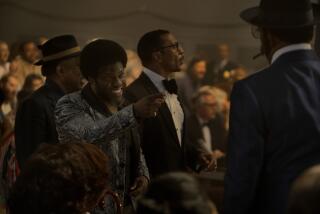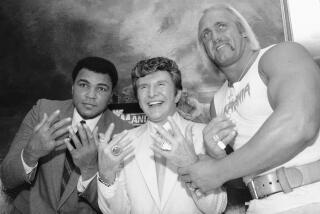Commentary: Muhammad Ali: America’s first and last Muslim hero
- Share via
Muhammad Ali was not our nation’s first famous Muslim, but he was the first and last cultural icon to make Americans comfortable with the idea that they could be Muslim without sacrificing the very ideals that make them so quintessentially American.
Ali, after all, started at the bottom and ended up at the top, literally fighting his way through the racism and limitations of pre-civil-rights America to become a living example of what can happen when you challenge the system — and win.
Success in the ring made him famous, but it was his personality — open-hearted, defiant, reckless, fallible — that made him the first Muslim that Americans felt they knew.
As a kid growing up in the 1970s, to see a fellow Ali with his own cartoon series (“I am the Greatest!”), comic book, action figure and pop song (about him, not by him) was to take pride in a name and faith that most of the time proved difficult.
When did Islam and pop culture ever collide in a positive way? Never, it seemed, until Muhammad Ali made it so.
>>Full coverage: The life and career of boxer Muhammad Ali
At school, taunts like “Hey Ali, are you a terrorist?” were neutralized by compliments likely intended as jeers: “Ali, are you related to Muhammad?” If only. Who wouldn’t want to be that cool, that powerful, that verbally dexterous?
When the heavyweight champ known as Cassius Clay converted to Islam in the early 1960s, the country had few reference points for the faith or its followers. It was before the U.S. became embroiled in the Mideast conflict of the late 1960s, the oil embargo of the early ’70s or the Iranian hostage crisis that started in late 1979.
Malcolm X and the Nation of Islam were essentially it, a domestic representation of the faith far different from the pre-World War II war imagery of minarets and flying carpets. African Americans were taking back a faith that slavery and institutionalized racism had denied them.
When Ali announced he’d converted to Islam with the guidance of Malcolm X, promoters threatened to cancel boxing matches and the news media refused to refer to him by his new Muslim name. But as he did with his opponents in the ring, the boxer eventually wore them down.
In photos from that period, Malcolm X is pictured more than once smiling and even laughing alongside Ali. Without the champ, it’s unlikely a photographer would have been compelled to capture a moment so incongruous with Malcolm X’s militant image.
Kareem Abdul-Jabbar, the next biggest name to convert to Islam at the top of his fame in 1971, took a more understated path than Ali (didn’t everyone?). He still caught flack from fans who felt he was turning his back on the Christian faith, but the road was a little less bumpy because of Ali.
Ali eventually converted to a more mainstream strain of Sunni Islam, and then Sufi Islam later in life. Throughout, he continued to speak out on behalf of American Muslims — and Muslims worldwide — addressing everything from 9/11, the rising tide of extremism and Islamophobia.
I am America. I am the part you won’t recognize. But get used to me. Black, confident, cocky; my name, not yours; my religion, not yours.
— Muhammad Ali
He did this even when the words didn’t flow as easily, when he had to fight his own body to make himself heard.
As recently as six months ago, he commented on the Muslim bashing being used as a tactic in presidential campaigning: Ali issued a statement titled, “Presidential Candidates Proposing to Ban Muslim Immigration to the United States” after Donald Trump’s proposal that Muslims be stopped from entering the country.
“Our political leaders should use their position to bring understanding about the religion of Islam,” Ali wrote, “and clarify that these misguided murderers have perverted people’s views on what Islam really is.”
American Muslims, whether generations-deep here or recent immigrants, owe thanks to Muhammad Ali for making us more than just the Other. We became an accepted part of culture, and pop culture, because of him.
Though the current climate of Muslim bashing may may feel like all that progress has been lost, it hasn’t. No one can break that deep connection Ali made with the American public, and how he challenged them to accept what they initially feared.
“I am America,” Ali once said. “I am the part you won’t recognize. But get used to me. Black, confident, cocky; my name, not yours; my religion, not yours; my goals, my own; get used to me.”
And we did.
On Twitter: @LorraineAli
READ MORE
To Muslims the world over, Muhammad Ali was ‘#TheGreatest’
When you take a nice Muslim boy from Baghdad to Coachella
Muhammad Ali and Howard Cosell were must-see sports TV
Beyoncé’s superpower: Keeping us guessing as she takes charge of her narrative
Deeply personal ‘I Am Ali’ scores an intimate knockout
More to Read
The complete guide to home viewing
Get Screen Gab for everything about the TV shows and streaming movies everyone’s talking about.
You may occasionally receive promotional content from the Los Angeles Times.







